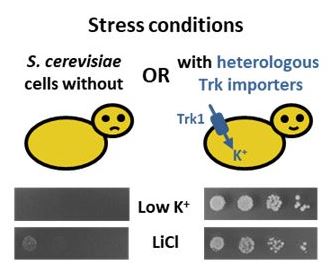Transporters reflected in specific properties of nonconventional yeasts
Some, so-called non-conventional, yeast species survive extreme changes in the environmental pH, temperature, or osmotic pressure. We aim to identify and characterize specific transporters whose activity contributes to the ability to survive adverse environmental conditions. The acquired knowledge will help to improve the properties of yeast species used in industrial processes.
Yeasts occupy various natural habitats where they are exposed to changes in their environment. A frequently occurring change is undoubtedly in the concentration of alkali metal cations, either the scarce, but for cells indispensable, potassium ions, or the naturally abundant and toxic sodium ions. To prevent damage and survive stressful conditions, yeast cells respond with a series of physiological processes that aim to adapt to new conditions. Ions cannot freely pass through semipermeable cellular membranes. The optimal intracellular amounts of alkali metal cations are maintained by the activity of specific proteins, ion transporters. One of the aims of our laboratory is to characterize alkali-metal-cation transporters of some nonconventional yeast species (Zygosaccharomyces rouxii, Debaryomyces hansenii, Yarrowia lipolytica, Kluyveromyces marxianus, Hortaea werneckii), and to elucidate if efficient transporters from nonconventional yeasts could improve properties of species used in the industry, e.g. S. cerevisiae and S. kudriavzevii (Zimmermannova et al. 2015, Dibalova-Culakova et al. 2018, Papouskova et al. 2022).
Trk potassium importers from non-conventional yeasts
Potassium is the main intracellular cation in yeast cells playing various physiological roles (compensation of negative charges of macromolecules, maintenance of cell volume or intracellular pH). Potassium ions are imported to cells by specific transporters, e.g. Trk proteins. The activity of these proteins helps the cells to grow not only in environments with low amounts of potassium but also in the presence of various stress factors, such as toxic sodium or lithium, and high ethanol or organic acids concentrations. We characterized Trk proteins from several non-conventional yeast species that can tolerate various extreme conditions and we showed that these heterologously expressed transporters may be used to improve the properties of industrial S. cerevisiae strains (Zimmermannova et al. 2015, Papouskova et al. 2022).

Improvement of properties of S. cerevisiae cells producing Trk importers from non-conventional yeasts (Papouskova et al. 2022). Cells with heterologous transporters grow better in low potassium conditions and support better Li+ toxicity.
